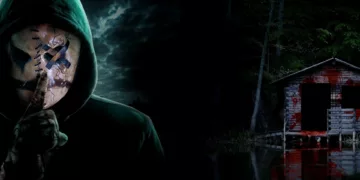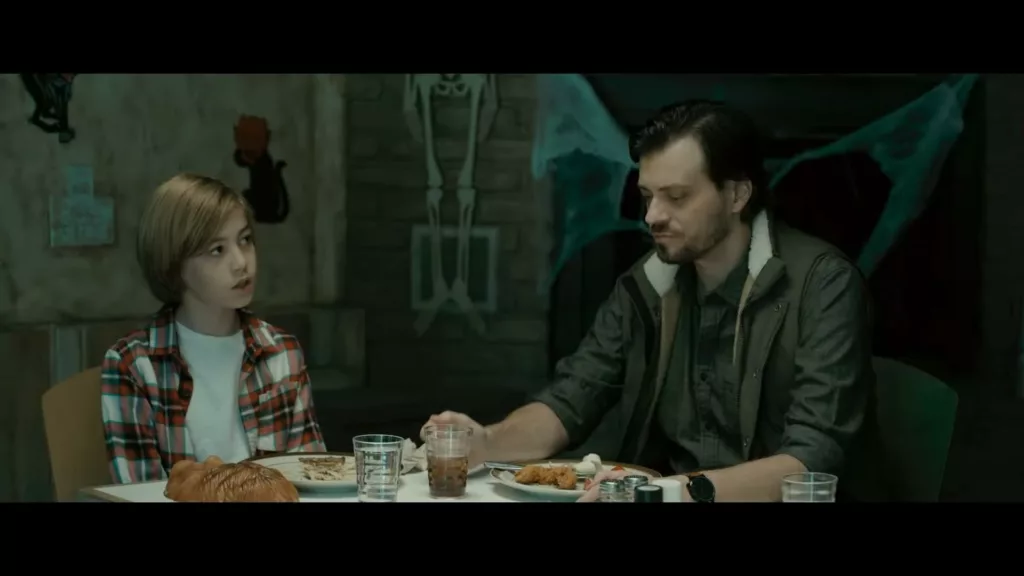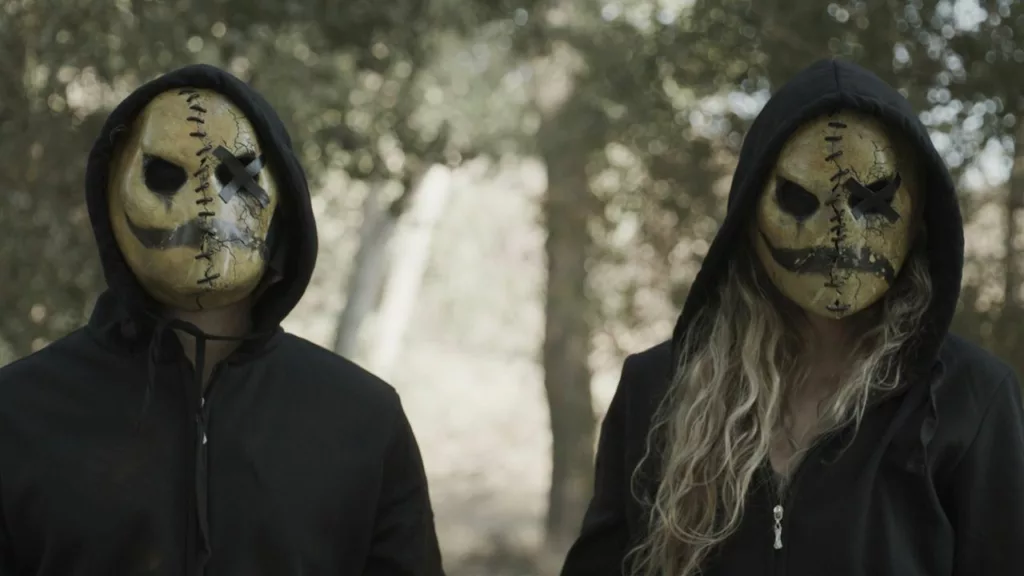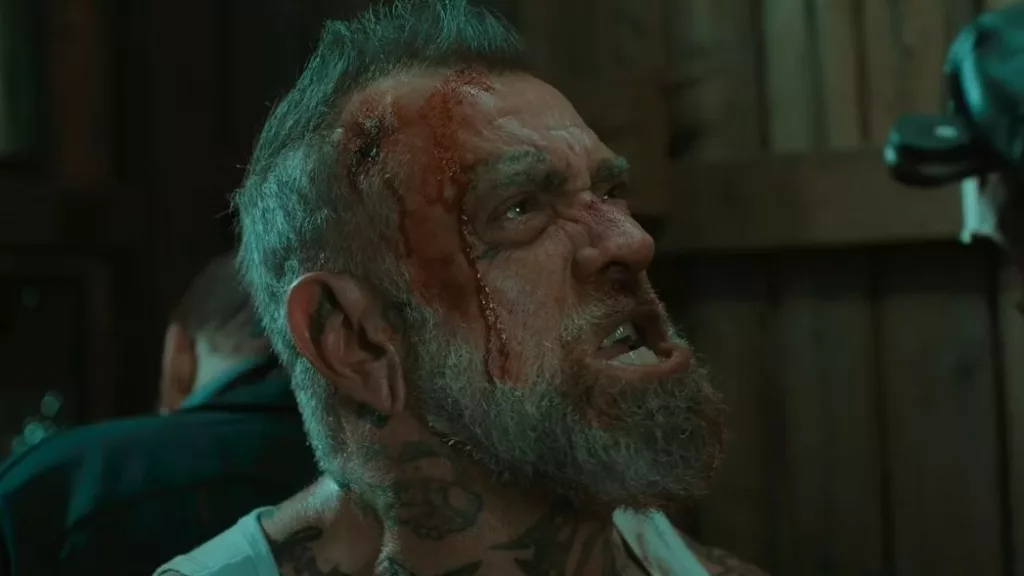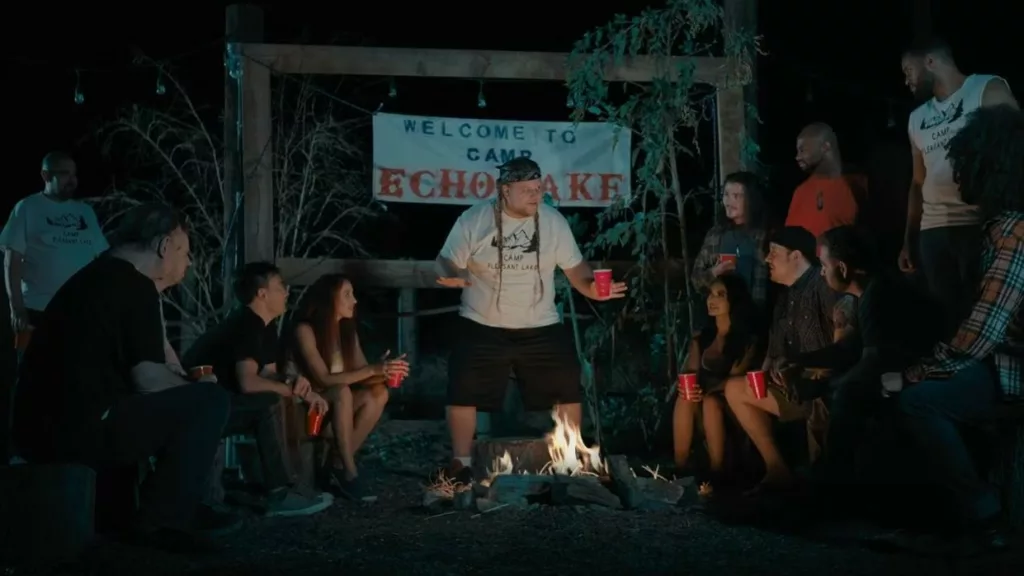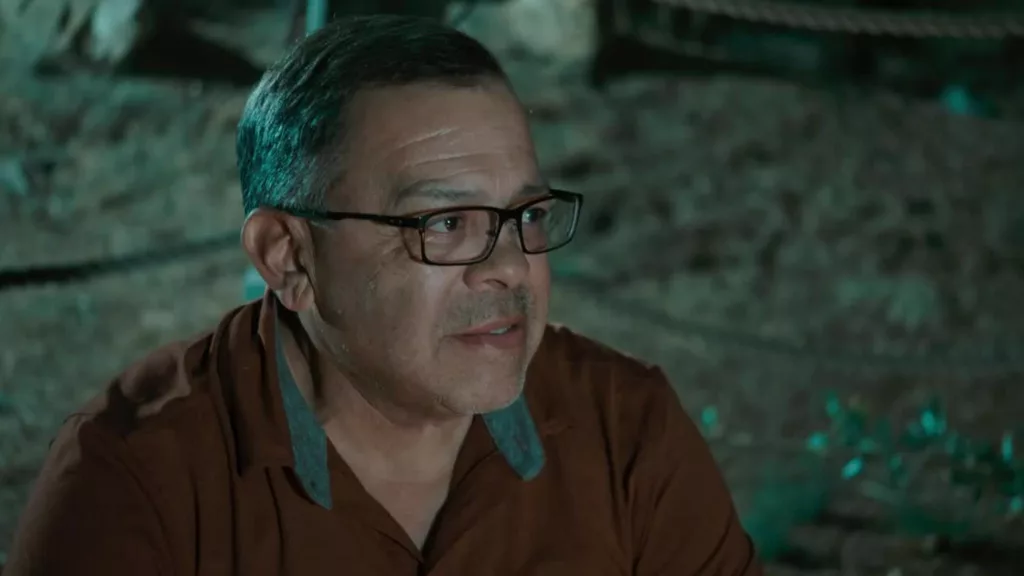Camp Pleasant Lake brings slasher thrills to summer camp, with a twist. When a dark piece of local history becomes campfire tales and immersive entertainment, things take a turn from fake frights to real-life horror.
The film comes from director Thomas Walton, who had indie hits with earlier horror flicks like They Turned Us Into Killers. Here he has conjured up a premise that merges past and present into a seamless nightmare.
The story follows the Rutherford family, who reopen the long-shuttered Camp Pleasant Lake as a spot for horror fans to LARP a fully immersive slasher weekend. But the camp holds real skeletons, like the unsolved disappearance of a young girl twenty years back. When the theatrical slayings planned for guests start looking all too real, we’re in for a bloody good time.
With a cast of familiar horror faces like Michael Paré and an intriguing core concept, Camp Pleasant Lake works best when it focuses on delivering straightforward genre thrills. The film runs into occasional pacing problems when it tries balancing one too many ideas, but the campground setting and central mystery offer plenty for horror buffs to sink their teeth into.
Nightmare Relived
Camp Pleasant Lake wastes no time jumping right into the spooky stuff. We open with a flashback to little Echo Meadows as she attends a special Halloween camp back when the grounds were known as Camp Echo Lake. But her campfire fun soon takes a sinister turn. Echo falls in with the wrong crowd of mean girl campers, gets lured off alone into the woods, and disappears without a trace. The only clues left behind are echoes of her cries ringing through the darkness.
When we return to the present day, Camp Echo Lake has new owners—a husband and wife team played by Michael Paré and Maritza Brikisak. They’ve renamed it Camp Pleasant Lake and reinvented the grounds as an immersive horror experience for audiences seeking some vicarious thrills. For a pricey ticket, you can stay the weekend and witness scripted counselor “killings” staged by a special effects crew. But with Echo Meadows’ case still unsolved after all these years, her spirit is said to haunt the camp.
It doesn’t take long for that local legend to come to life. On opening night, a real knife-wielding maniac starts crashing the performance and picking off campers for some unscripted slaughter. As the body count rises, people struggle to separate fabrication from reality. Is this still part of the show, or has Echo’s ghost returned to unleash vengeance on the site of her demise?
The film takes its time slowly ratcheting up suspicion while introducing possible suspects. Red herrings get thrown in amongst camp employees connected to the area’s history. But soon enough, a hooded killer fully takes center stage to give audiences what they paid for—no-holds-barred homicidal action.
A Killer Concept
At its core, Camp Pleasant Lake plays with the contrast between escapist horror fantasy and the sobering reality of true evil existing in plain sight. On one hand, we see the appeal of immersive horror events that let everyday people live out scream queen fantasies from the safety of a fictional realm. But interwoven is commentary on those who profit from repackaging real-life tragedies as macabre entertainment.
The film makes several references to our cultural obsession with turning serial killer histories into lurid streaming content. Camp Pleasant Lake slyly jabs at the cottage industry around profiting off the gruesome fates of real victims. The camp owners who transform the grounds by erasing its painful history in favor of a flashy horror experience become stand-ins for our appetite for sensationalized crime. While escapism has its place, the movie asks us to think about who suffers when we treat hardship and loss as disposable inspiration.
Ultimately, Camp Pleasant Lake seems to argue that peddling real people’s suffering as spectacle dehumanizes us in ways scarier than any fictional monster. It’s a theme that cleverly mirrors how the campers struggle to separate fiction from reality as the body count rises. Just like the enthusiasm for all things morbid can numb our empathy in the real world, the camp descends into chaos when desensitized to warnings that the slashing has gotten all too genuine.
While executed with B-movie cheese at times, the smartest thing about Camp Pleasant Lake is how it couches bigger questions within familiar horror fare. It may not always hit the mark, but works as a self-aware slasher homage with touches of meta-commentary on why we crave these dark flights of fancy in the first place.
“Rejoin the world’s favorite feathered prankster in our Woody Woodpecker Goes to Camp review. Dive into camp chaos and nostalgic adventures as Woody disrupts the peace and battles old rivals in this modern update of a beloved classic.”
Finding the Fun in Fear
If Camp Pleasant Lake stumbles a bit when juggling complex ideas, director Thomas Walton displays a steady hand when it comes to delivering horror thrills on a budget. He leans into a retro aesthetic that feels both familiar and fresh, using little touches to transform the campground into an ideal stage for DIY scares.
Walton and cinematographer David M. Parks find creative ways to maximize their grounded location. Tracking shots follow the killer through campgrounds and cabins littered with ominous tribal masks straight out of Friday the 13th. Night scenes glow with flickering campfires and strings of red bulbs that make things just shadowy enough for the imagination to run wild. The camera moves with purpose even in confined spaces, building tension as it tails potential victims.
It’s clear Walton set out to make a film that celebrates spectacle and practical effects. There is care put into highlighting gruesome makeup and finding novel kill scenes, like when a camper gets turned into a human jack-o-lantern. An exploding RV covered in axe-flinging firemen is exactly the level of zany one hopes for. Do effects occasionally show their seams? Sure, but it only adds to the retro vibe.
While more money and polish may have better served the smarter aspects of Camp Pleasant Lake, its heart is clearly in delivering a handcrafted horror good time. Walton doesn’t try to punch above his weight class, keeping things small in scale while finding creative flair through lighting, composition, and little touches of character in the production design. What the film lacks in deep meaning, it often makes up for in DIY charm.
A Cast That Delivers the Goods
While Camp Pleasant Lake struggles to develop some characters beyond basic horror archetypes, it finds itself in capable hands with genre movie veterans. Leading the pack is Michael Paré, who brings a grizzled charisma to camp owner and showman Rick. He leans into the smarmy salesmanship of someone looking to cash in on bloodlust with a sly wink. Jonathan Lipnicki seems to revel in getting to shed his child star past, diving headfirst into an unhinged performance as true crime podcaster Jasper.
The young echo Meadows, played earnestly by Lacey Burdine, makes the most of limited screen time. We feel her isolation and building dread as she’s torn away from her family. While the script leaves some key players thin, solid performances manage to fill in gaps through sheer personality. Even smaller roles pop thanks to familiar faces like Robert LaSardo, who makes an impression as a menacing cook with only a few lines.
Of course, any slasher lives or dies by its villain. And where many assets feel stretched thin, Camp Pleasant Lake delivers in spades when it comes to the masked killer themselves. We get little details about motivation or backstory, but the physicality brings palpable menace. Scenes of the hooded menace tilting their head quizzically while cycling through weapons have energy that transcends dialogue.
At the end of the day, Camp Pleasant Lake hangs together thanks to a cast that knows exactly what film they are in. They attack the material with earnestness, finding the fun without slipping into full parody. In a story light on complexity, the actors find plenty to sink their teeth into when it comes to serving up sly winks, outsized personas, and the chilling single mindedness of a classic slasher heavy.
Keeping Up the Fear Factor
If Camp Pleasant Lake occasionally loses narrative momentum, it makes up for it with a commitment to tone. Director Thomas Walton clearly set out to make an homage to 80’s slashers that revels in the slow build of dread. The film takes its time soaking in the atmosphere and drawing out secrets of the camp’s past.
The extended flashback introducing the films core tragedy feels essential rather than slowed down. We get immersed in an eerie Halloween evening that spirals out of control, staging echoes that will reverberate later. It establishes stakes while letting us marinate in the creepy camp grounds as a blank slate before its reinvention years later.
Once the carnage kicks into high gear, Walton displays a grasp of rhythm when it comes to balancing violence. Deaths never feel rushed, taking the time to let both tension and graphic payoffs play out. We get creeping camera movements transforming into ruthless executions. Even later as the body count piles up, Walton spaces out major showstoppers to avoid monotonous butchery.
The movie stays sure-handed when maintaining its overall sense of atmosphere from start to finish. Jokes mostly avoid undercutting sinister vibes, while lighter touches like campfire singalongs keep things from becoming too bleak. As flawed as the plot can feel, Camp Pleasant Lake understands that in slashers tone is king. It commits to transporting viewers to a world where turn of the century camp horror never died. For Ft13th devotees, that consistency of atmosphere goes a long way.
Killer Concept, Choppy Execution
At its core, Camp Pleasant Lake brings a clever genre twist that asks audiences to confront the appeal of turning real tragedy into escapist fantasy. The film makes thought-provoking use of the contrast between immersive horror events as entertainment versus the lingering impact of actual crimes. Whileexecuted with B-movie cheese and uneven pacing, Camp Pleasant Lake works best as a self-aware rollercoaster when it focuses on delivering shlocky thrills.
The movie stumbles a bit under the weight of its ideas, Never quite balancing multiple tones. But for horror buffs along for a bloody ride, it doesn’t disappoint. Director Thomas Walton clearly set out to produce a love letter to old-school slashers. His retro aesthetic and creative kill scenes bring DIY charm even when the story feels undercooked. Add to that a game cast that includes genre legend Michael Paré, and the overall experience satisfies.
Is Camp Pleasant Lake a new gold standard for the industry? No. Would a little more thought into character and tighter plotting have helped its smarter themes land? Absolutely. But, what the movie lacks in polish, it makes up for in spirit.
At a brisk 80 minutes, Walton’s passion for horror history shines through the rough edges enough to scratch that horror itch. For fans of scrappy indie genre fare, it delivers on the promise of a gory good time. Camp Pleasant Lake may flirt with being a cut above average, but succeeds in blending big ideas with the kind of camcorder chaos its clear influences pioneered.
The Review
Camp Pleasant Lake
Camp Pleasant Lake brings clever commentary on turning tragedy into entertainment, though uneven execution holds it back. Still, Walton’s retro style and passion for DIY spectacle make it a solid choice for slasher fans.
PROS
- Clever concept merging real and staged horror
- Strong atmosphere and retro slasher vibe
- Creative direction and fun practical effects
- Michael Paré and other genre vets give solid performances
CONS
- Uneven pacing and tonal issues
- Underdeveloped characters and plot holes
- Low budget quality shows at times
